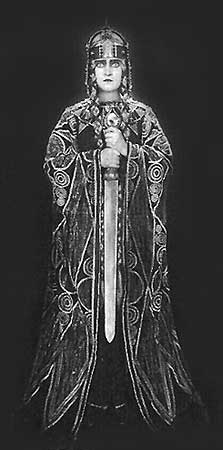Kriemhild’s Revenge: Die Nibelungen, Part 2 (Fritz Lang, 1924): Germany
Reviewed by Byron Potau. Viewed on DVD.
 In Kriemhild’s Revenge, part two of Fritz Lang’s epic Die Nibelungen, Kriemhild weaves disaster for all those around her. The film’s title really says it all , however, this sequel to Siegfried is more of an action/adventure film with lots of fighting than a fantasy/adventure, lacking the magic and mysticism of its predecessor.
In Kriemhild’s Revenge, part two of Fritz Lang’s epic Die Nibelungen, Kriemhild weaves disaster for all those around her. The film’s title really says it all , however, this sequel to Siegfried is more of an action/adventure film with lots of fighting than a fantasy/adventure, lacking the magic and mysticism of its predecessor.
Still living at Worm’s Castle with her brothers, Kriemhild is still hell bent on revenge against Hagen Tronje (Hans Adalbert Schlettow) who killed her husband Siegfried, with considerable help from Kriemhild’s stupidity. Tronje does not help his case any when he steals the Nibelungen treasure from her. Despite everyone in the castle having loved Siegfried and everyone knowing Tronje murdered him they have an inexplicable loyalty to him which denies Kriemhild her revenge. She leaves the castle and marries Attila the Hun in the hopes that he can exact the revenge that she desires. However, not all goes as planned and there is considerable bloodshed and atrocities committed on both sides.
As said before, this film lacks the magic of Siegfried, and appears more grounded in reality. Without the magic it seems the technical aspects are not as impressive. The sets are good, but not awe inspiring as before, the costumes for Hagen Tronje and Kriemhild are still excellent, but those for the Huns are minimal.
The acting as a whole for the Huns is as exaggerated as their makeup. Fritz Lang regular, Rudolph Klein-Rogge, as Attila is better than the rest of the Huns, but the makeup is still too over the top. Like in Siegfried, the swordplay leaves something to be desired and since there is so much more of it in this film it becomes much more noticeable. Margarete Schon as Kriemhild is the film’s strongest asset. No longer sweet and easily duped, she adopts an icy demeanor and statuesque stance throughout much of the film.
All in all, this film is a superior example of silent filmmaking, but is a small step down from Siegfried and could have benefited from a little magic that filled that film. Still, it is a fine film and a worthy, satisfying, and enjoyable conclusion to the story.
About this entry
You’re currently reading “Kriemhild’s Revenge: Die Nibelungen, Part 2 (Fritz Lang, 1924): Germany,” an entry on Student Film Reviews
- Published:
- 01.18.09 / 10pm
- Category:
- DVD, Films, Silent films
No comments
Jump to comment form | comments rss [?] | trackback uri [?]